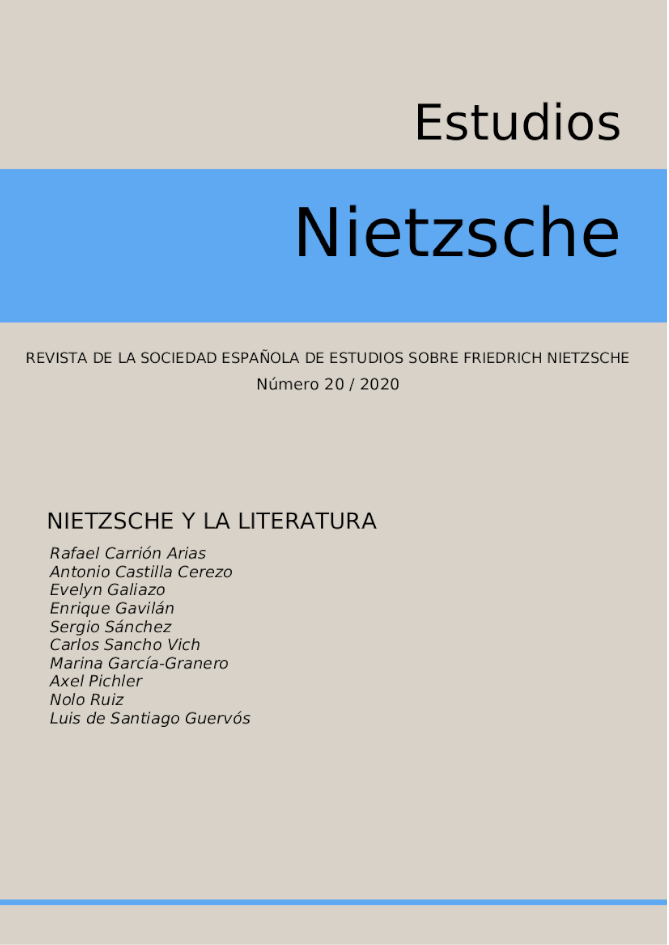Notes on the early reception of Nietzsche in Hispanic America: Darío, Rodo, Reyles
DOI:
https://doi.org/10.24310/EstudiosNIETen.vi20.10239Keywords:
Modernism, Ruben Dario, Rodo, Reyles, imperialism, cristianism, democracy, Egalitarianism, modernityAbstract
The early reception of Nietzsche in Hispanic America came about in the Modernismo, a wide cultural movement in which the complex transition of our countries into Modernity can be attested under a double influence: a strong dependence on the european culture and the sway of America’s imperialist expansion. The Nicaraguan Rubén Darío, and the Uruguayans José Rodó and Carlos Reyles – dominated by a strong, wide-ranging francophilia –, forged an image of Nietzsche strongly indebted to Fouillée, Sorel, De Gourmont, etc. The paper sketchs a description of this “French Nietzsche” from the early readings of the philosopher in Hispanic America.
Downloads
Metrics
References
ALBERT, Henri: Frédéric Nietzsche, Paris: Bibliotheque Internationale d’Edition, 1903.
BOURDEAU, Jean: Les maîtres de la pensée contemporaine, Paris: Alcan, 1904.
BOURGET, Paul: Essais de psychologie contemporaine, París: Lemere, 1883 (Baudelaire y otros estudios críticos, traducción y edición a cargo de Sergio Sánchez, Estudio preliminar de Giuliano Campioni, Notas al texto, Cronología del autor y Bibliografía de Francesca Manno, Ediciones del Copista, Córdoba [Argentina] 2008).
BRANDES, Georg: «Frédéric Nietzsche, une étude sur le radicalisme aristocratique» en Essais choisis. Renan-Taine-Nietzsche-Heine-Kielland-Ibsen, trad. S. Garling- Palmer, Paris: Mercure de France, 1914.
BRUNETIÈRE, Ferdinand: Discours de combat, I re série, Paris: Colin, 1906.
CAMPIONI, Giuliano: «Nietzsche et le nihilisme français», en Actes de la Deuxième Biennale Nietzscheana «Nietzsche et la France, la France et Nietzsche». CNRS, París (en prensa).
CAMPIONI, Giuliano: Nietzsche y el espíritu latino, traducción castellana de Sergio Sánchez, Buenos Aires: El cuenco de plata, 2004.
CÂNDIDO, António: Introducción a la literatura del Brasil, La Habana, 1971.
DARÍO, Rubén: «Richepin» en El Heraldo de Costa Rica, San José, 22 de marzo de 1892.
DARÍO, Rubén: «Los Raros. – Filósofos “finiseculares” – Nietzsche – Multatuli» en La Nación (Buenos Aires), lunes 2 de abril de 1894, p. 1, cols. 6-7.
DARÍO, Rubén: «El triunfo de Calibán» aparecido en El Tiempo de Buenos Aires, 20 de mayo de 1898.
DARÍO, Rubén: España contemporánea, París: Garnier Editores, 1901.
DARÍO, Rubén: «Las fiestas de Renan» en La Nación, 20 de octubre de 1903.
DARÍO, Rubén: Los raros, Girona: Wunderkammer, 2019.
DARÍO, Rubén: Obras completas, Madrid: Editorial Mundo Latino, 1917-1920, Vol. XXI: 1919.
DARÍO, Rubén: Opiniones, Madrid: Librería de Fernando Fé, 1906.
DE GOURMONT, Remy: Épilogues. 1899-1901, Paris: Mercure de France, 1915.
DEMOLINS, Edmond: A quoi tient la superiorité des anglo-saxons, Paraís: Fermin-Didot et C ie , 1902.
FERNÁNDEZ RETAMAR, Roberto: Todo Calibán, Clacso, 2004.
FOUILLÉE, Alfred: Morale des idées-forces Paris: Alcan, 1907.
FOUILLÉE, Alfred: Nietzsche et l’inmoralisme, Paris: Alcan, 1902.
LE BON, Jacques: Les lois psychologiques de l’évolution des peuples, París: Félix Alcan, 1894.
LE BON, Jacques: Psychologie des foules, París: Félix Alcan, 1895.
LE RIDER, Jacques: Nietzsche en France. De la fin du XIXe siècle au temps présent, Paris: PUF, 1999.
LICHTENBERGER, Henri: La Philosophie de Nietzsche, Paris: Alcan, 1898.
NIETZSCHE, Friedrich: Kritischen Gesamtausgabe Werke, herausgegeben von Giorgio Colli und Mazzino Montinari, Berlin/New York: Walter de Gruyter, 1967ff. (edición digital corregida: http://www.nietzschesource.org/).
RAMA, Ángel: Las máscaras democráticas del modernismo, Montevideo: Fundación Ángel Rama, 1985.
REAL DE AZÚA, Carlos: Ambiente cultural del 900 – Carlos Roxlo: un nacionalismo popular, Montevideo: Arca Editorial, 1950.
RENAN, Ernest.: Souvenirs d’Enfance et de Jeunesse, Paris: Calman-Lévy, 1923.
Downloads
Published
How to Cite
Issue
Section
License
As of issue 21 (2021) this journal is published only in open access (diamond route).
From that number 21, like the previous numbers published in NIETZSCHE STUDIES, they are subject to the Creative Commons Acknowledgment-NoComercia-ShareIgual 4.0 license, the full text of which can be consulted at <http://creativecommons.org/licenses/by-nc-sa/4.0 >
It is the responsibility of the authors to obtain the necessary permissions of the images that are subject to copyright.
This work is licensed under a Creative Commons Attribution-NonCommercial-ShareAlike 4.0 International License.
Copyright generates two different rights: moral rights and patrimonial rights that EJFB recognizes and respects. Moral rights are those relating to the recognition of the authorship. They are rights of a personal nature that are perpetual, inalienable, unseizable and imprescriptible as consequence of the indivisible union of the author and his/her work.
Patrimonial rights are those that can be derived from the reproduction, distribution, adaptation or communication of the work, among others.







11.png)
